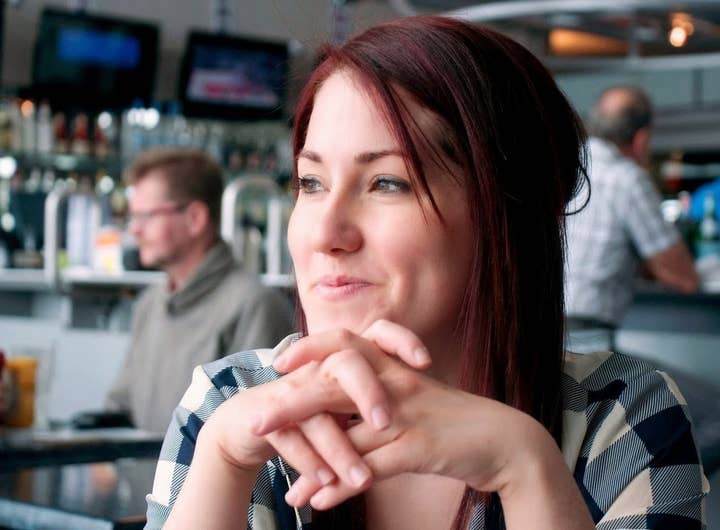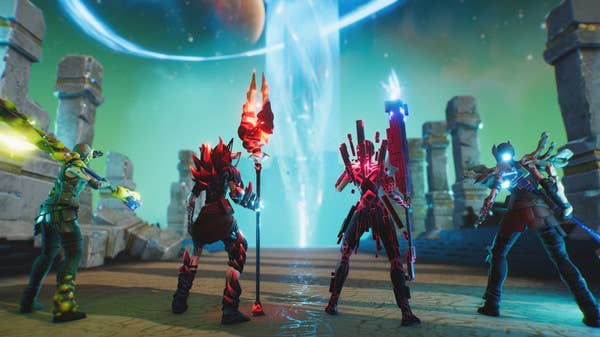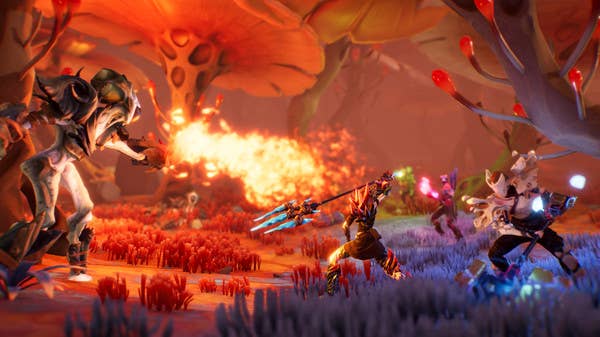Eden Rising's language shift from 'free-to-play' to just 'free'
Nvizzio's Brent Ellison and Kim Pasquin offer insight on the reasons and communication challenges behind the game's unusual business model
The term 'free-to-play' has turned into quite the misnomer, as general manager Kim Pasquin, creative director Brent Ellison, and the team at Nvizzio Creations found out while working on Eden Rising.
Eden Rising is a new open-world adventure title with tower defense elements from the studio behind Roller Coaster Tycoon World. It's a far cry from the park building sim in just about every way, from its genre to its gameplay to its visuals to, most notably, its unique business model.
There are two "editions" of Eden Rising. The Explorer Edition is entirely free and contains between 12 and 15 hours of open-world gameplay. The Ascendant Edition costs $25 and expands the game significantly in size and scope, but it also comes with a perk -- anyone who doesn't own the Ascendant Edition can access all of its content simply by grouping up and playing with someone who does own it, allowing them to experience the full game for free.
Pasquin says that the community aspect was the impetus for creating the unusual payment model, alongside a desire to make a game that would attract attention on the crowded Steam storefront.

"We really wanted to give a lot of people access to Eden Rising without too high a cost," Pasquin says. "It's a co-op game, and we wanted friends to be able to play together. We used to be able to do bundles on Steam -- buy one, get the second one half-price -- but this doesn't really happen anymore. This is a Steam game, so we were trying to figure out a way friends could play together without having to spend too much money, and make the game accessible and playable by most people.
"Without making something different, it's really hard to make a game stand out on Steam because there are so many games that come out. We wanted to do something a bit different that will build a community that eventually we can do something more monetizable for, like a sequel or DLCs. But our first goal was to bring people to the game so they can see this product."
Pasquin says the team took some inspiration from free-to-play mobile games, but ultimately wanted to stay far away from anything that looked like microtransactions. Currently, the only thing Eden Rising has that could be viewed as a microtransaction is a single pack of cosmetic DLC for sale.
"The term 'free-to-play' communicated something other than what we were doing"
Brent Ellison
However, even though the studio specifically kept away from microtransaction model, the idea behind it nonetheless became an issue for Nvizzio early on due to miscommunication.
"Specifically, one problem we had with communication was the word 'free-to-play,'" says Ellison. "That gave a lot of people a different idea of what we were doing, so we removed that term. It communicated something other than what we were doing.
"Free-to-play put people in the mind of: 'I can play this game as long as I want, but it will be a big grind and I will have microtransactions pushed at me.' There are people who want that -- they want thousands and thousands of hours for free, effectively. That wasn't what we were offering. So we removed that and replaced it with 'free' rather than 'free-to-play' in order to give us more breathing room to explain what it was about. The consequence was really those people who were looking for a free-to-play game getting something different than what they were expecting."

Ellison and Pasquin also both note that the presence of microtransactions, while beneficial for ongoing games, tends to break immersion in games like Eden Rising where the world and story carry a lot of weight. Nvizzio didn't like the idea of a game where the player was interrupted regularly with pop-ups and other notifications inviting them to spend money.
Of course, that ended up being a difficult tightrope to walk, because the game does have points where it has to stop players and ask them to pay to continue.
"A big mistake we did at first was when people were exploring, they were hitting this extra zone right away from the Ascendant Edition," Pasquin says. "If they had gone to the left, they could have continued, but they didn't see that because if you went on the right side you hit that wall right away, which was a terrible mistake... They hadn't even played a fifth of the free content. We've changed that - it was just a question of level design, so we redesigned that part of the world. That probably got rid of a lot of frustration."
Ellison adds: "We also did more to expose what you did have access to. And of course the player never hits a true wall. If they go onto the world browser and find someone else who owns the game, they can join that game and experience the content."
"We think we have more people playing the game than we would have had without the free version"
Kim Pasquin
Eden Rising is a relatively new game, having launched just last month. And while its payment model is somewhat reminiscent of games like Super Mario Run, or MMOs like World of Warcraft that allow a player to get to a certain point for free before buying in, it's still a model that doesn't have an easy shorthand for players to understand what they're getting.
At the game's launch, Pasquin and Ellison say the team was especially concerned about Eden Rising's 15-hour free version being characterized as a demo. The release ended up being a bit rocky largely due to the communication issues, but Pasquin says the team is improving.
"At first, when we launched, people did not really understand the business model," she says. "It was new and hard to comprehend. Right after the first day, after that big pass of not understanding, people have really liked the business model and enjoyed and understood it. We think we have more people playing the game than we would have had without the free version. We had more than 100,000 people -- more than we anticipated.
"So far it has worked in the sense that we got some visibility we didn't expect to. The negative is that our first communication was not clear enough, so we readjusted. Are we monetizing a lot right now? We have a good conversion rate to the Ascendant's Edition, the full version. It's not converting everyone, but we're seeing some people are buying the full version."

I asked Pasquin and Ellison to elaborate a bit further on what conversion rates looked like, though they were unable to offer further specifics. Currently Eden Rising is offering a good chunk of its content without making a profit on it. If not enough players jump into the paid version or choose to ride the coattails of those who have, then doesn't that mean the game won't be profitable at all?
Pasquin will only say that the studio is open to changing the model if it turns out to be a bust, but for now Nvizzio wants to give it a shot.
"There's no real negative to it," she says. "Either you play a cool game for 15 hours, if you like it, either you or one of your friends buys it, and you play for more hours. If it brings more frustration to the community and the community doesn't like it, we're there for the community. But right now we want to give this a chance, and the risk isn't on the player -- it's on us, to make less money."
Ellison adds: "I'd be surprised if we did any iterations on this game in terms of the business model. It'd be more on future games."
For now, the team is working on extra content for Eden Rising, both paid DLC similar to the existing cosmetic pack, as well as content to "increase the value of the premium edition," as Ellison puts it.
To teams who might be considering a similar model, Pasquin's advice is to focus on good communication.
"When you want to do a business model like this, you put community at the heart of it. What we've learned is that sometimes marketing words are not what work. It's clarity, and being very up front with what you are offering, and what you are not offering. That seems to be the key."

